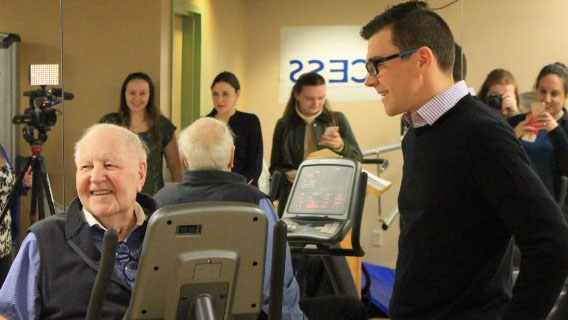Cancer treatment
QEII launches exercise program for cancer patients
ACCESS is a 12-week exercise program for patients with cancer or in remission

caption
Former Nova Scotia premier John Buchanan, left, with Jeff Zahavich, smiles as he shows what exercise he does in the ACCESS program.The Nova Scotia Health Authority and Dalhousie University have announced a two-year research study that incorporates exercise into cancer treatment.
Activating Cancer Communities through an Exercise Strategy for Survivors, or ACCESS, launched Friday at the Queen Elizabeth II Health Sciences Centre in Halifax. Designed for both current patients and those in remission, the program has been running for just over two months.
“This will bring us closer to making exercise a routine part of cancer treatment and care,” said Dr. Drew Bethune, medical director of the Nova Scotia Cancer Care Program.
Patients who take part in ACCESS do aerobics, cardio and resistance training over a 12-week period. Resistance training is done with low weights and repetition. Related stories
ACCESS is paid for by Medical Services Insurance Program. Patients can reapply for the program after the 12 weeks at a reduced cost.
Jeff Zahavich, a certified exercise physiologist and PhD candidate at Dalhousie, said the physical activities are tailored to the patient and based on how they feel that day. He said if a patient is feeling tired from treatment, the program will be adjusted.
“Some of the big changes we’ve noticed already, in the short time working with the participants, is reduced levels of fatigue, increase in mood, improved quality of live, pain free range of motion,” Zahavich said during the announcement.
Currently, there are 26 patients in various stages and with various types of cancer participating in the study.
Participants must have a diagnosis and be 18 or older before taking part. Those who have had cancer before they were 18 can participate, as long as they are of age when starting the program. They can be self-referred or referred by their doctor.
Previously, cancer patients were told not to do much exercise to avoid additional fatigue. About 10 years ago, research was published showing cancer patients could benefit from exercise. Researchers have spent the past few years looking at these claims.
Former Nova Scotia premier John Buchanan has been involved in the ACCESS program for nine weeks. He described his goals after he started exercising to help his prostate cancer recovery.
“I look forward in the future to running a 10 mile — maybe even the Boston Marathon!” he joked during the announcement.
Buchanan, 87, was diagnosed with cancer in 2016. He said he was very active before his diagnosis and has enjoyed spending his treatment time on the stationary bikes.
He thinks others could benefit from ACCESS and hopes it will receive more funding. He called on Dalhousie, NSHA and the QEII to continue the program.
ACCESS received $50,000 of venture funding from the QEII. Most of the money is used to supplement salaries of people working on the study.
Alberta Cancer Exercise was used as a model for ACCESS. Researchers hope that patient recovery will improve with the program.
ACCESS is hosted at the QEII’s Dickson Building. The program will also be held at the Canada Games Centre starting the second week of January. Thirteen additional patients will be added at that time.
About the author

Carmen Guillena
University of King's College journalism student, Mount Saint Vincent University graduate with a Bachelor of Arts in Sociology.
P
Pauline Murphy